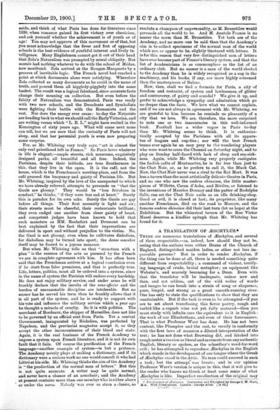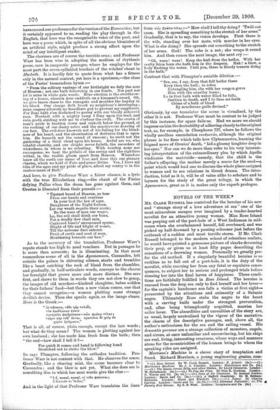A TRANSLATION OF /ESCHYLUS.*
THERE are numerous translations of 2Eschylus, and several of them respectable,—as, indeed, how should they not be, seeing that the authors were either Deans of the Church of England, distinguished maiden ladies, or other not less im- peccable persons P But in order to render 2Eschylus, if the thing can be done at all, there is needed something quite different from respectability ; a command of violent, terrify- ing language, of crude, brutal metaphor; an equipment like Webster's, and scarcely becoming for a Dean. Even with that the translator will be inadequate, unless now and then, and not seldom, out of the wild welter of words and images he can break into a strain of song or eloquence, pure, limpid, and strong as a great smooth-running river. One has only to state the qualifications to show that they are unattainable But if the task is even to be attempted—if you are to set about transfusing this fierce poetry, rough and turbid like a superb wine not yet fully matured—then you must study with infinite care the equivalent to it in English : the work of our Elizabethans, and even of their forerunners. That is what Professor Warr has done. He has not been content, like Plumptre and the rest, to versify in conformity with the first laws of scansion a diluted interpretation of the text; he has not done what Browning did, and hitched into rough metre a versionas literal and as remote from any authentic English, Merely or spoken, as the schoolboy's word-for-word crib'; he has attempted to reproduce ,Fichylus in the English which stands in the development of our tongnewhere the Greek of lEschylus stood in' he Attic. No man could succeed in such a task; but the attempC was heroic; and in our opinion' Professor Warr's version is unique in this, that it will give to the reader who knows no Greek at least some sense of what tEschylus is like. Imperfect recollection of the original may
• The Oreetela of dEsehmius. Tranclated and Explained by George O. W. WAIT, ILA. With Glustiations. London : George Allen. [71.1141.]
have caused our preference for the version of the Eumenides; but it certainly appeared to us, reading the play through in the English, that here was the recognisable voice of the poet, and here was a poem which, in spite of all the obvious blemishes of an artificial style, might produce a strong effect upon the mind of any intelligent reader.
The choruses are of course the terrible crux; and Professor Warr has been wise in adopting the medium of rhythmic prose, save in anapEestic passages, where he employs for the most part the seven-syllabled trochaic of the witches' chant in Macbeth. It is hardly fair to quote from what has a fitness only in the natural context, yet here is a specimen,—the close of the Furies' tremendous hymn :— " From the solitary vantage of our birthright we defy the sons of Heaven ; not one hath fellowship in our feasts. Nor part nor lot is mine in white gala weeds. Mine election is the overthrow- ing of a house, wherein Ares cnddleth on a kinsman's sword. Oh, we give brave chase to the runagate and moulder the heyday in his blood. Our charge doth brook no neighbour's interloping ; mine empery alloweth no breedbate god to prevent my suppliants. For Zeus bath e'en disdained to parley with our bloody abhorred race. Howbeit with a mighty ramp I fling upon the trail, and ruin goeth striding with me to o'erbear the swift. The crown of man's pride is trodden down and sinketh below the ground, at the rushing of our dusky robes and the mischievous dancing of our feet. The evil-doer knoweth not of his falling for the blind- ness of his heart, and the abomination of darkness that is upon him. He heareth not the sound of rumour ; he seeth not the gathering of a thick cloud upon his house. Awful are we, who inhabit eternity, and our sleight never faileth, the recorders of wickedness, in whom is no relenting. With worship none nor recompense, we beat the pitfalls of the seeing and the sightless withal, in the visible gloom apart from Heaven. Wherefore know all the earth our name of fear, and hear this our plenary charter, which we hold of Fate and grace divine. Yea, I have my title of the ages and my pride of place, albeit my sentry is in the sunless murk of Hell."
And here, to give Professor Warr a fairer chance, is a lyric With the true Elizabethan ring,—the chant of the Furies defying Pallas when the doom has gone against them, and Orestes is liberated from their pursuit :— " Upstart brood of Heaven, ye tear From our hands and overbear In your lust the law of ages. Daughters of the Night forlorn, Let our wrath requite their scorn; Be the woes of men our wages. Lo, the soil shall drink our bane, For a deadly dew shall rain, Cankered hearts' envenomed spume, Blight of life and blight of womb, Till the noisome dust entomb Fruit of earth and seed of man, Mouldering beneath our ban."
As to the accuracy of the translation, Professor Warr's repute stands too high to need vouchers. But in passages he is more than accurate; he is illuminating. In that most tremendous scene of all in the Agamemnon, Cassandra, left outside the palace in shivering silence, starts and trembles like a beast catching the reek of blood from the shambles, and gradually, in half-articulate words, conveys to the chorus her foresight that grows more and more distinct. She sees first, and shows to them in words they are not slow to grasp, the images of old murders—kindred slaughter, babes sodden for their fathers' food—but then a new vision comes, one that they cannot recognise,—a woman plotting some strange devilish device. Then she speaks again, as the image clears.
Here is the Greek :— " leo TefAaiva, 'role TeXas,
Tby dizoSip.nov wooly
Aotrrpoiirt 4azap6sco-a-76.4 ibpdsco TAos ; nixos yap v(Sa' icercu. wpoTotrot xelp itc X€Pbs aplyizaTa."
That is all, of course, plain enough, except the last words ; but what do they mean? The woman is plotting against her own husband ; she has made him fresh from the bath ; then "the end—how shall I tell it?— For quick it comes and hand is following hand Stretched out to strike the blow."
So says Plumptre, following the orthodox tradition. Pro- fessor Warr is not content with that. He observes the sense. Gradually, like a. clearing mist, the scene becomes clear to Cassandra ; and the blow is not yet. What she does see is something dim to which her next words give the clue :— " r, wawa, wawai; •rt 763€ cpalveras; ShrruiSr TentLdou."
And in the light of that Professor Warr translates the lines from 7:,L;ppra, TiAec :—" How shall I tell thy doing? 'Twill out anon. She is spreading something to the stretch of her arms." Gradually, that is to say, the vision develops. First there is the wife, standi g over her mate, with murder in her eyes. What is she doing? She spreads out something to the stretch of her arms. God! The robe is a net ; she wraps it round him. And then comes the next image, the next cry :— " Oh, ware ! ware! Keep the bull from the heifer. With her crafty felon horn she hath him in the drapery. Hah I a blow, a body flashing the water. I tell you, there is bloody treason doing in the bath."
Contrast that with Plumptre's amiable dilution :— "See, see, I say, from that fell 'heifer there Keep thou the bull; in robes
Entangling him, she with her weapon gores Him with the swarthy horns ; Lo in that bath with water filled he falls, Smitten to death, and I to thee set forth Crime of a bath of blood By murderous guile devised."
Obviously, by one translator the scene is visualised, by the other it is not. Professor Warr must be content to be judged by this instance, for space fails us. Had we more we should impress on him the desirability of adhering closely to the original text, as, for example, in Choephorce 737, where he follows the wholly needless emendation alcv0p6nr7dy, although the original phrase is far finer which tells how Clytemnestra, learning the feigned news of Orestes' death, "hid a gloomy laughter deep in her eyes." Nor can we do more than refer to his very interest- ing interpretation of the extraordinary plea by which Apollo vindicates the matricide—namely, that the child is the father's offspring, the mother merely a nurse for the seed—a point which would lead one to discuss the whole place assigned to woman and to sex relations in Greek drama. The intro- duction, brief as it is, will be of value alike to scholars and to laymen for the study of the great trilogy, in which the Agamemnon, great as it is, makes only the superb prologue.



































 Previous page
Previous page